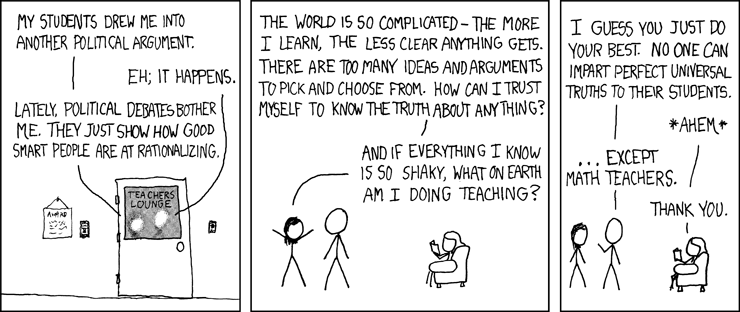263: Certainty
| Certainty |
 Title text: a(b+c)=(ab)+(ac). Politicize that, bitches. |
Explanation[edit]
Megan and Cueball are teachers in this comic, talking about their students and the political discussions with them. Megan expresses concern that political discussions shake her beliefs in what's true, then worries that if she cannot trust herself to determine the truth, she can't trust herself to teach it. Cueball reassures her by saying that it's not possible to teach a singular, real truth. However, he is interrupted by a harrumph of the mathematics teacher Miss Lenhart and states that Mathematics is an exception (because math can actually be proved, conclusively). Randall likes mathematics because mathematical political discussions are not possible.
The title text shows a simple valid mathematical equation, the distributive property, and Randall is daring one to politicize it. Though this happened years after the comic was published, people have in fact politicized the distributive property, claiming that teaching it promoted socialism.
Transcript[edit]
- [A door seen from a hallway, with "Teachers' Lounge" on the glass. Next to the door, a framed "Award" certificate is displayed. Silhouetted through the glass, two teachers can be seen talking.]
- Megan: My students drew me into another political argument.
- Cueball: Eh; it happens.
- Megan: Lately, political debates bother me. They just show how good smart people are at rationalizing.
- [Internal view of the room. The two teachers, Megan and Cueball, continue talking. Megan has her arms raised. Miss Lenhart is seen reading a book on a sofa.]
- Megan: The world is so complicated - the more I learn, the less clear anything gets. There are too many ideas and arguments to pick and choose from. How can I trust myself to know the truth about anything?
- Megan: And if everything I know is so shaky, what on Earth am I doing teaching?
- [Megan and Cueball continue talking. Cueball has his hand raised. Miss Lenhart has looked up from her book.]
- Cueball: I guess you just do your best. No one can impart perfect universal truths to their students.
- Miss Lenhart: *ahem*
- Cueball: ...Except math teachers.
- Miss Lenhart: Thank you.
Discussion
This was done 6 years later by Fox News. 72.70.180.234 10:44, 31 May 2013 (UTC)
It's easy to politicize that. Abelians versus non-Abelians ;) Not all vector spaces will likely share the property seen there.67.204.136.58 23:34, 15 August 2013 (UTC)
If you flip ab + ac around, you end up with ac + ab which looks a lot like ACAB and that can get political very fast. 94.76.233.42 (talk) (please sign your comments with ~~~~)
Abelian means that ab = ba, but this distributive law is different. Both the distributive property and the Abelian property are assumed properties of numbers, i.e., accepted as true and used to prove more complicated properties. Non-Abelian examples of objects that "look" like numbers are not too hard to construct. One interesting example is where "a" abd "b" are rotating a book clockwise 90 degrees (a) and rotating the book forward 90 degrees (b). Start with the book facing you for reading and first do "a", then "b", which is written "ab". The result has the front of the book facing up. Now do "b" first, then "a", to get "ba". Now the binding of the book is facing up and the front of the book is facing to the right. So, "ab" is not "ba". The best I can think of for the distributive type of thing is for everything to make sense, except b+c is something for which multiplying by "a" is undefined.--DrMath 09:07, 22 November 2013 (UTC)
But what about cryptography? A mathematical topic, and hardly apolitical nowadays. However, I appreciate and enjoy Randall's sentiment about the purity of mathematics. 108.162.219.223 20:23, 17 January 2014 (UTC)
Politicize that? Easy. When you apply the same policies to a diverse group, the outcome differs from person to person. Just insert context and it can work in a wide range of situations. 108.162.246.211 02:12, 14 July 2014 (UTC)
Ways math can be, and often is, politicized:
- Politicians and government bureaucrats have imposed "New Math" of various types on children forced to suffer the public school system, several times.
- Don't forget the famous stories of legislators wanting to change pi to be equal to 3.0 like it is in the Old Testament, parodied on Usenet and by my favorite author in Stranger in a Strange Land.
- Mathematics is one of the biggest forms of lying that advocates of central planning use. There are lies, damned lies, and statistics.
- To expand on that last one, math is fundamentally little more than an expression of logic using a notation system as language. Many logical fallacies can be seen as mathematical fallacies. Essentially, a(b+c)=(ab)+(ac) can be complexified until it is very long and convoluted, but then tweaked so that it ceases to be true, and many will not notice the error at a glance. And this is what many verbal expressions of both formal and informal logical fallacies are essentially doing.
—Kazvorpal (talk) 14:27, 29 October 2019 (UTC)
The Old Testament does not declare pi equal to 3.0; that's actually a common misconception (see paragraph 3).
